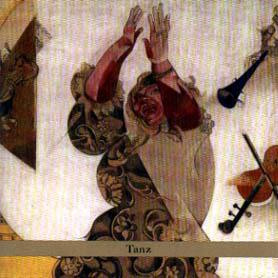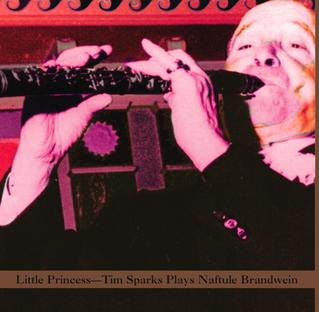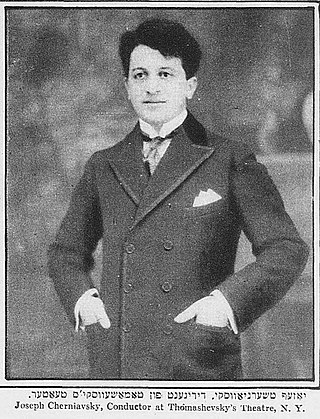
Klezmer is an instrumental musical tradition of the Ashkenazi Jews of Central and Eastern Europe. The essential elements of the tradition include dance tunes, ritual melodies, and virtuosic improvisations played for listening; these would have been played at weddings and other social functions. The musical genre incorporated elements of many other musical genres including Ottoman music, Baroque music, German and Slavic folk dances, and religious Jewish music. As the music arrived in the United States, it lost some of its traditional ritual elements and adopted elements of American big band and popular music. Among the European-born klezmers who popularized the genre in the United States in the 1910s and 1920s were Dave Tarras and Naftule Brandwein; they were followed by American-born musicians such as Max Epstein, Sid Beckerman and Ray Musiker.

Masada is a musical group with rotating personnel led by American saxophonist and composer John Zorn since the early 1990s.

Naftule Brandwein, or Naftuli Brandwine, was an Austrian-born Jewish American Klezmer musician, clarinetist, bandleader and recording artist active from the 1910s to the 1940s. Along with Dave Tarras, he is considered to be among the top klezmer musicians of the twentieth century, and has a continuing influence on musicians in the genre a century later. Along with Tarras and other contemporaries like Israel J. Hochman, Max Leibowitz and Harry Kandel, he also helped forge the new American klezmer sound of the early twentieth century, which gradually gravitated towards a sophisticated big-band sound.
A nigun or niggun is a form of Jewish religious song or tune sung by groups. It is vocal music, often with repetitive sounds such as "Bim-Bim-Bam", "Lai-Lai-Lai", "Yai-Yai-Yai" or "Ai-Ai-Ai" instead of formal lyrics. Sometimes, Bible verses or quotes from other classical Jewish texts are sung repetitively to form a nigun. Some nigunim are sung as prayers of lament, while others may be joyous or victorious.
Devekut, debekuth, deveikuth or deveikus is a Jewish concept referring to closeness to God. It may refer to a deep, trance-like meditative state attained during Jewish prayer, Torah study, or when performing the 613 commandments. It is particularly associated with the Jewish mystical tradition.

Abe Schwartz was an American klezmer violinist, composer, Yiddish theater and ethnic recordings bandleader from the 1910s to the 1940s. In his various orchestras, he recorded many of the leading klezmer musicians of the early twentieth century, including Naftule Brandwein and Dave Tarras.

Tim Sparks is an American acoustic guitar player, singer, arranger and composer.

At the Rebbe's Table is the third recording by guitarist Tim Sparks on the Tzadik Records label.

Tanz is the second recording by American guitarist Tim Sparks on the Tzadik Records label, released in 2000. The word טאַנץ is Yiddish for dance, cognate to the German word Tanz with the same meaning.
Dave Tarras was a Ukrainian-born American klezmer clarinetist and bandleader, a celebrated klezmer musician, instrumental in Klezmer revival.

Joel Rubin is an American clarinetist, klezmer musician, ethnomusicologist, and scholar of Jewish music. Since becoming involved in the klezmer revival in the late 1970s, he has been researching, teaching and performing klezmer music and related genres. He has been a member of, or performed with, such groups as Brave Old World, the Joel Rubin Ensemble, and Veretski Pass.
Jacob Joseph of Polonne, (1710–1784) or Yaakov Yosef of Pollonye, was a rabbi who was one of the first disciples of the founder of Hasidic Judaism, the Baal Shem Tov.

Filmworks XX: Sholem Aleichem features a score for film by John Zorn. The album was released on Zorn's own label, Tzadik Records, in 2008 and contains music that Zorn wrote and recorded for a documentary on the 19th century Jewish writer Sholem Aleichem.
Shloimke Beckerman also known as Samuel Beckerman, was a klezmer clarinetist and bandleader in New York City in the early twentieth century; he was a contemporary of Dave Tarras and Naftule Brandwein. He was the father of Sid Beckerman, also a klezmer bandleader.
Sidney Beckerman (1919–2007) was an influential klezmer clarinet player. He learned the style from his father Shloimke, who was himself a well known klezmer soloist. Sidney played Jewish weddings and celebrations in New York City and the Catskills throughout the 1930s. After World War II ended, he returned to New York and started working for the US Postal Service.

Little Princess is the eighth album by guitarist Tim Sparks and his fourth on the Tzadik Records label. It is a tribute album to the music of Klezmer clarinetist Naftule Brandwein.
In music, the Ukrainian Dorian scale is a modified minor scale with raised 4th and 6th, and lowered 7th degrees, often with a variable 4th degree. It has traditionally been common in the music of Eastern Europe, Southeast Europe, and the Mediterranean including Jewish, Greek, Ukrainian, and Romanian music. Because of its widespread use, this scale has been known by a variety of names including Altered Dorian, Hutsul mode and Mi Shebeirach. It is also closely related to the Nikriz pentachord found in Turkish or Arabic maqam systems.

Max Leibowitz was an American klezmer violinist, composer and bandleader in New York City primarily in the 1910s and 1920s.

Joseph Cherniavsky was a Jewish American cellist, theatre and film composer, orchestra director, and recording artist. He wrote for the Yiddish theatre, made some of the earliest novelty recordings mixing American popular music, Jazz and klezmer in the mid-1920s, was also musical director at Universal Studios in 1928-1929, and had a long career in radio and musical theatre.

Stempenyu was the popular name of Iosif Druker, a klezmer violin virtuoso, bandleader and composer from Berdychiv, Russian Empire. He was one of a handful of celebrity nineteenth century Jewish folk violinists from Ukraine; others included Aron-Moyshe Kholodenko "Pedotser" and Yechiel Goyzman "Alter Chudnover" from Chudniv. Sholem Aleichem loosely based his 1888 novel Stempenyu: A Jewish Novel on the real-life Stempenyu; it was adapted into various stage and film versions in the twentieth century.













